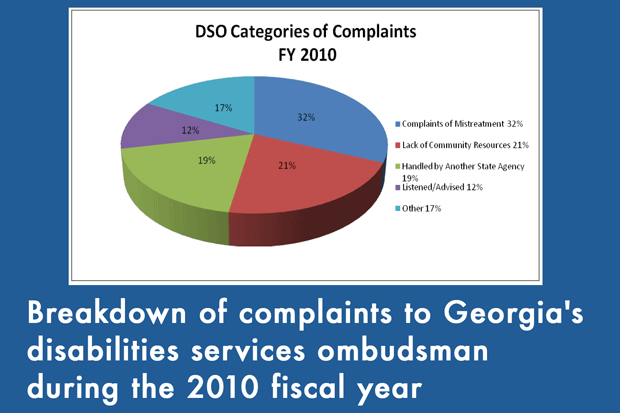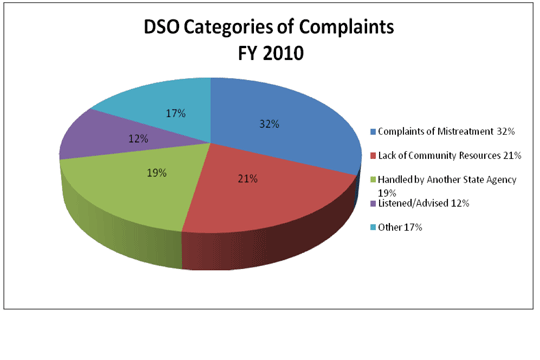
A little-noticed state report says an independent review team found poor medical care in the deaths of 23 patients at Georgia’s mental hospitals during the past fiscal year.
The report, from Georgia’s disability services ombudsman, also shows that the state’s mental health system remains plagued by other major problems, despite more than a year of scrutiny by the U.S. Department of Justice. Many patients still sit for hours in general hospitals’ emergency rooms, waiting for mental health treatment. And jails across the state still house a high percentage of people with psychiatric illnesses, the report adds.
Still, the state ombudsman who produced the report, Jewel Norman, said she sees improvement in the seven state-run psychiatric hospitals.
Many deaths at the mental hospitals in fiscal 2010 that were questioned by a review team involved a failure to perform medical tests on patients, said Norman, who resigned as ombudsman in August due to health reasons. The number of questionable deaths has been decreasing, she added.
“I have not seen blatant neglect,’’ Norman said in a recent interview. “I have not seen any deaths like Sarah Crider’s.’’
The death of Crider, 14, at Georgia Regional Hospital/Atlanta in 2006 became a public symbol of serious problems in the state’s psychiatric hospitals. Crider died from a severe intestinal blockage that went undetected by hospital staff.
Her death was detailed by the Atlanta Journal-Constitution in the first of a series of 2007 articles, “Hidden Shame,’’ which reported that more than 100 Georgia mental hospital patients died under suspicious circumstances over a five-year period. The newspaper series led to an investigation by the Justice Department.
Georgia’s Department of Behavioral Health and Developmental Disabilities, which oversees the psychiatric hospitals and the mental health system, declined to comment on the contents of the report Wednesday. Spokesman Tom Wilson, in an e-mail statement, said the agency and Gov. Sonny Perdue’s office consider it a ‘’draft report’’ – even though it’s labeled ‘’interim report,’’ and is posted on the Internet.
“The agency didn’t have a chance to make corrections for a final report,’’ the statement said. “We did work closely with the ombudsman during her tenure to address problems that she identified.‘’
Long waits in emergency rooms
The state ombudsman fields complaints and promotes the rights of people with mental illness and those with developmental disabilities or addictions.
Norman was the state’s first disability ombudsman, taking office in July 2009. The Legislature created the ombudsman position in 2000, but funding was not appropriated by the state until last year.
A year ago, a newly formed medical team started to review all deaths in state hospitals and those that occurred soon after discharge.
The ombudsman report went unnoticed by media and many stakeholders in the mental health system. Since Norman resigned, her position has not been filled.
The ombudsman report found that during an eight-week period this year, the average time for a patient waiting in an ER for state mental health services was 36 hours. One individual waited six days.
A 9-year-old boy waited in an ER for 27 hours while in restraints, the report said. The boy, a victim of physical and sexual abuse, finally was transferred to a general hospital with a psychiatric unit.
Ellyn Jeager, policy director for Mental Health America of Georgia, said the ombudsman report shows the state’s mental health system ‘’still has quite a ways to go.’’ Jeager said she was not surprised by the ongoing problems in treatment related to jails and ERs, but that parts of the report, such as the deaths, “were really disturbing.’’
Legal settlement dominates news
In October, state officials reached a groundbreaking settlement with the Justice Department to improve Georgia’s mental health system. As part of the deal, Georgia agreed to specific targets – and to spend $77 million – for creating housing aid and community treatment for people with disabilities, who in the past have often cycled in and out of the state hospitals.
The goal of the accord is to help people with mental illness and other disabilities receive services in their communities, and not be forced to live in institutions.
Consumer advocacy groups see the community services settlement as a model for other states.
Thomas Perez, assistant attorney general for civil rights at the Department of Justice, cited Crider’s death before he announced the settlement with the state of Georgia, according to an NPR/Kaiser Health News report. “This settlement is too little too late for her [family],” Perez said. “But it will help so many others like her living in institutions.”
“This was an absolutely tragic and preventable death,” said Perez. “She didn’t need to be in that institution. She could have thrived as an outpatient.”
A separate agreement between the DOJ and the state to improve care in the hospitals was recently ratified by a federal judge.
“We now have in place a plan via our settlement agreement with the DOJ to further improve and expand services for people with mental illness and developmental disabilities,’’ said the statement from the Department of Behavioral Health and Developmental Disabilities.
Jeager said the ombudsman’s report has been overlooked because of a focus on the DOJ settlement. Many people aren’t aware that the ombudsman office exists, she added.
Eric Spencer, executive director of the Georgia chapter of the National Alliance on Mental Illness, said the report highlights the fragmentation of care among the state hospitals, ERs and jails. “There’s just a lack of available services in the community for people,’’ Spencer said.
Norman said she is still working as a contractor in directing the independent medical team that reviews deaths in the state hospitals. She said she’s concerned that not enough is being done for children and adolescents with mental illness.
The next year is crucial for Georgia’s mental health system, with the creation of community services mandated by the DOJ settlement, Norman said.
“When we do these community services, I hope them do them correctly,’’ she said. “It takes money to do them correctly.’’

